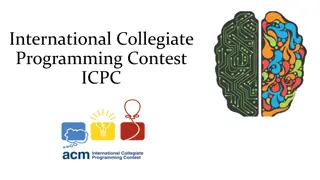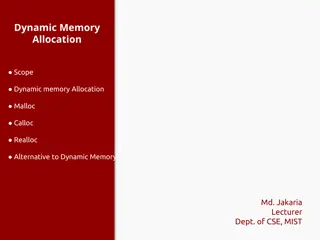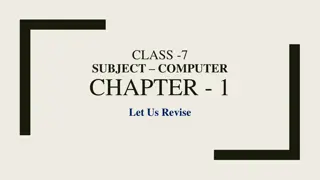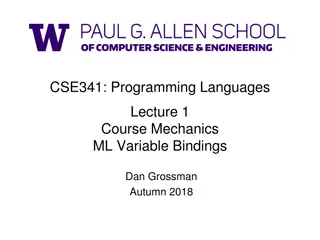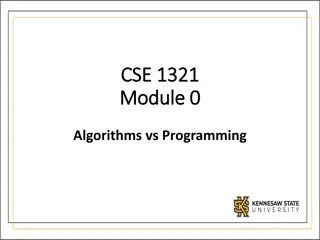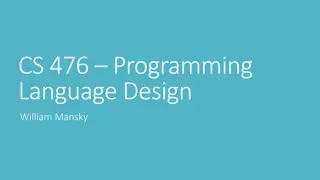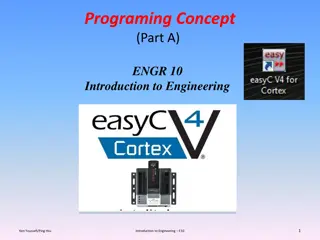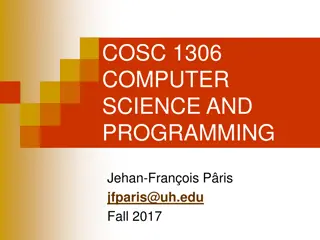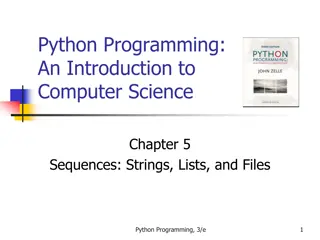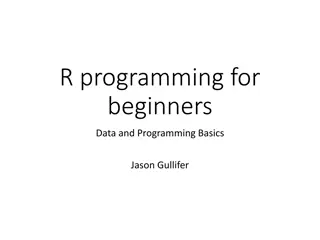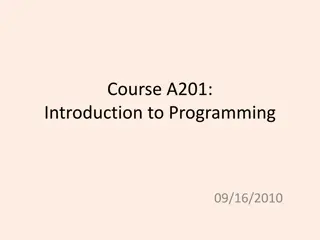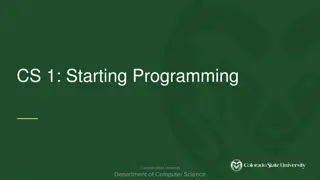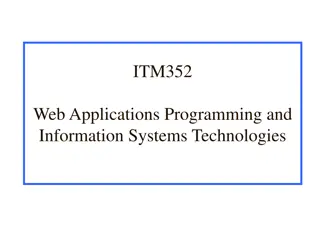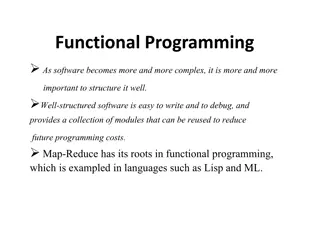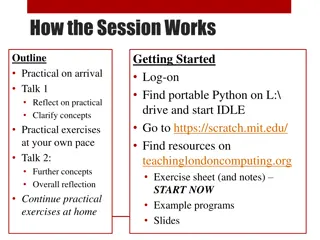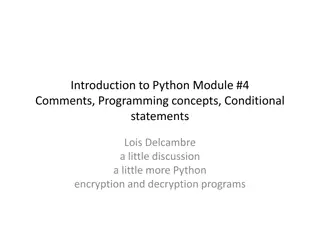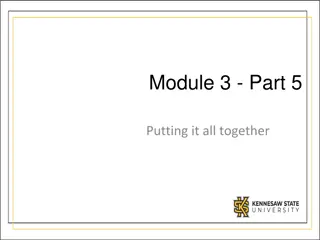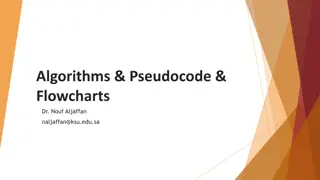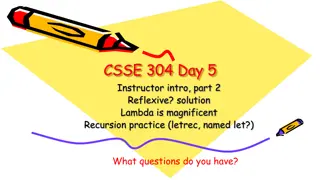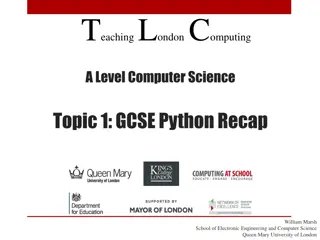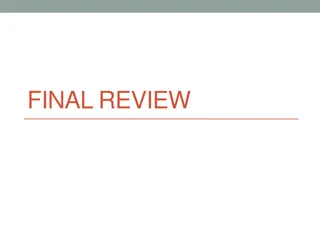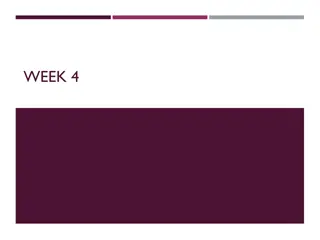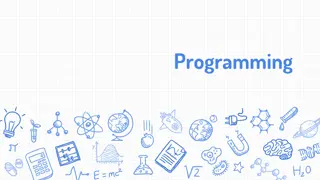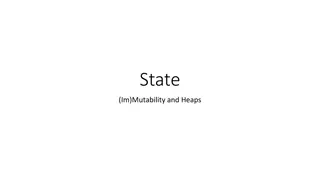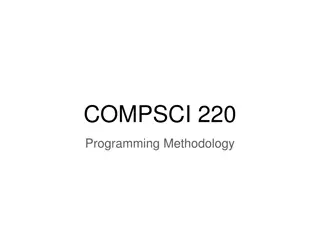Functional Programming
Functional programming, a paradigm that emphasizes declarative programming, pure functions, and limited side effects. Explore the benefits and characteristics of functional programming languages.
0 views • 20 slides
Programming in C: Overview and Constants Explanation
Programming in C is a fundamental introductory guide to the C programming language. It covers the basics of C, including its development history, character set, constants, and rules for constructing constants like integer and real constants. Dr. M. A. JAMAL MOHAMED YASEEN ZUBEIR, an Assistant Profes
3 views • 33 slides
International Collegiate Programming Contest (ICPC) Overview and Rules
The International Collegiate Programming Contest (ICPC) is a prestigious global competition in competitive programming supported by major tech companies like Google and Facebook. Participants tackle logical and mathematical problems by developing efficient algorithms and implementing them in various
5 views • 17 slides
Decision Analysis and Operations Research in Management
This content delves into Management Decision Analysis and Operations Research techniques such as Linear Programming, Integer Linear Programming, Dynamic Programming, Nonlinear Programming, and Network Programming. It covers the phases of an Operations Research study, mathematical modeling for decisi
0 views • 36 slides
Understanding Dynamic Memory Allocation and Variable Scope in Programming
This content delves into the concepts of dynamic memory allocation, variable scope, and the lifetime of local variables in programming. It explores the scopes of variables in different contexts and addresses issues like dangling pointers and out-of-scope references. The images provided visually enha
0 views • 40 slides
Module 2: PSEA and Safe Programming Training of Trainers (ToT) by CRS HRD
This Module 2 focuses on PSEA and Safe Programming, covering key sessions on understanding safe programming, identifying protection and SEA risks, and mitigating risks. It emphasizes the importance of safe programming in increasing safety, dignity, and access, with staff playing a crucial role. Part
2 views • 19 slides
Understanding Computer Programming: Basics and Beyond
In this chapter, we delve into the fundamental concepts of computer programming. We explore the definition of a program, the role of programming languages, types of programming languages, and generations of programming languages. Additionally, an assignment is provided to reinforce the key learnings
0 views • 25 slides
Understanding Object-Oriented Programming (OOP) in Python
Python is a versatile programming language that supports various programming approaches. Object-Oriented Programming (OOP) is a popular method in Python where objects are created to solve programming problems. OOP in Python focuses on creating reusable code, following the principle of DRY (Don't Rep
1 views • 35 slides
Introduction to Computers and C++ Programming Lecture 1 - Overview and Basics
This lecture covers the fundamental concepts in computer systems and programming using C++. Topics include the main components of a computer, bytes and addresses in memory, computer systems hardware and software, understanding programs, programming languages, compilers, preparing and running C++ pro
1 views • 21 slides
Autumn 2018 CSE341 Programming Languages Course Overview
Welcome to the Autumn 2018 CSE341 course on Programming Languages! Join us for a comprehensive 10-week journey to grasp the core concepts that underlie all programming languages. Dive into ML, Racket, and Ruby while honing your programming skills through homework assignments. Engage with the course
1 views • 32 slides
Web Application Development and Programming CTE Program Overview
Viera High School offers a comprehensive CTE program in Web Application Development and Programming, taught by Mr. Dohmen. Students learn popular programming languages like Python, SQL, JavaScript, Java, C#, and C. The courses cover web programming, JavaScripting, and PHP programming, providing cert
1 views • 7 slides
Understanding Algorithms and Programming: A Visual Introduction
Explore the fundamental concepts of algorithms and programming through visual representations and practical examples. Learn about algorithmic thinking, abstraction, recipe-like algorithms, and the importance of logical steps in accomplishing tasks. Discover how algorithms encapsulate data and instru
1 views • 17 slides
Introduction to Programming with RobotC in Robotics Education
Programming in robotics involves giving specific directions to a robot using software like RobotC. This introduction covers the basics of programming, software organization, and how to get started with RobotC through creating flow charts and programming tasks. Learn about setting up RobotC, creating
0 views • 8 slides
Understanding Input and Output in Programming: A Comprehensive Guide
This content provides detailed explanations and examples on input and output handling in programming, focusing on concepts such as I/O as State, typed output, and consuming input lists. It covers topics like using print statements, scanning inputs, and building output lists in programming languages.
0 views • 44 slides
Introduction to Programming and Computer Instructions
Programming is the process of creating instructions for computers to follow and accomplish tasks. It involves turning human language instructions into detailed binary machine language. Before learning programming, individuals may have different levels of experience, ranging from no experience to pro
0 views • 16 slides
Development of Attosecond Theory for Nobel Prize through Verilog Programming
Attosecond generation is a crucial technique for creating attosecond pulses by manipulating radiation waves. This research paper focuses on developing the Attosecond generation equation through Verilog programming and validating it using test programming techniques. The interface between equations,
0 views • 15 slides
Introduction to Computer Programming in Engineering
Computer programming in engineering involves breaking down tasks into small steps to instruct a computer. This process requires understanding programming languages such as C, C++, and Java, and concepts like Object-Oriented Programming (OOP). The sequential execution of expressions and the importanc
0 views • 36 slides
Introduction to Basic Python Programming Concepts
In this Fall 2017 course, COSC 1306 - Computer Science and Programming by Jehan-François Périr, students delve into the fundamental concepts of Python programming. The course covers values, data types, strings, and identifying malformed strings in Python code.
0 views • 57 slides
Introduction to Python Programming: Strings, Lists, and Files
This chapter delves into the fundamental concepts of Python programming related to sequences, specifically focusing on strings, lists, and file processing. It covers the representation of strings, various operations that can be performed on them, basic ideas of sequences and indexing for strings and
0 views • 109 slides
CS252 Systems Programming Course Overview
This course overview covers topics such as C programming review, Unix basics, Unix systems programming, and grading details. The course includes labs on C/C++ programming, Unix shell scripting, and writing your own shell. Communication is emphasized through Piazza for questions/answers and Blackboar
0 views • 41 slides
Introduction to R Programming for Beginners: Data and Programming Basics
Learn the fundamental concepts of R programming for beginners, covering topics such as data checking, changing types, working with data frames, factors, NA values, and optimal data formatting. Understand the importance of tidy data and experiment design, along with practical examples and tips to enh
0 views • 27 slides
Introduction to Python Programming Concepts and Basics
Explore the fundamentals of Python programming with topics covering Boolean values, comparison operators, keywords, indentation rules, conditional statements (IF, WHILE), and keep-trace scenarios in code implementation. Understanding these concepts is essential for beginners in programming.
0 views • 16 slides
Introduction to Programming Concepts at Colorado State University
Engage in the fundamentals of programming at Colorado State University's Department of Computer Science. Explore topics such as variable declaration and assignment, data types, and the importance of programming. Develop essential skills to read, write, and understand basic program structures. Enhanc
0 views • 14 slides
Introduction to Programming Languages and Functional Programming with OCaml
Welcome to Lecture 1 of CSEP505 on Programming Languages focusing on OCaml and functional programming. Professor Dan Grossman introduces the course, discusses the importance of studying programming languages, and shares insights on course mechanics and content. Topics include staff introductions, co
0 views • 84 slides
Understanding ITM352 and Its Role in MIS
Welcome to ITM352, a course focusing on acquiring basic programming skills in a business context. This course emphasizes hands-on experience in developing relevant software applications, addressing real technology problems, and fostering rapid self-learning of IS/IT technologies. Misconceptions arou
0 views • 36 slides
Understanding Functional Programming Paradigm
Functional programming emphasizes well-structured software that is easy to write and debug, with reusable modules to reduce future programming costs. It introduces higher-order functions and first-class function values, fostering declarative programming for tasks like symbolic data manipulation and
0 views • 21 slides
Essential Principles of Teaching Programming Languages
Foundational concepts in programming form the core of computing. This encompasses understanding programming fundamentals, teaching language aspects effectively, statistical programming for data analysis, and guiding students unfamiliar with programming environments towards grasping the logic and sim
0 views • 23 slides
Exploring Computer Programming Principles
Dive into the world of computer programming, covering high-level and machine languages, compilers, interpreters, writing programs, top-down design, and the array of programming languages available. Understand the essentials of building code to control computers, the diversity of programming language
0 views • 23 slides
Transitioning from Scratch to Python: A Practical Approach for Learning Textual Programming
Explore the transition from visual programming in Scratch to textual programming in Python using Turtle Graphics. Engage in practical exercises, clarify key concepts, and reflect on the challenges and progress in learning core programming concepts. Utilize resources from TeachingLondon Computing to
0 views • 21 slides
Enhancing Python Programs with Comments and Programming Concepts
Understanding the importance of code readability through comments, Python programming concepts, conditional statements, and encryption/decryption. Explore tips for making code more readable, such as using booleans, if-elif-else statements, and while loops. Consider the significance of code appearanc
0 views • 80 slides
Understanding Object-Oriented Programming Concepts and Polymorphism Using Java and C#
Explore key Object-Oriented Programming concepts like inheritance, method overriding, abstract classes, interfaces, and polymorphism through examples in Java and C#. Delve into class structures, casting, and handling different object types at runtime. Learn how to effectively utilize these principle
0 views • 12 slides
Understanding Algorithms, Pseudocode, and Flowcharts in Programming
Learn the fundamental concepts of algorithms, pseudocode, and flowcharts in programming through a series of detailed explanations and visual representations provided by Dr. Nouf Aljaffan. Explore the stages in program development, creating algorithms, computational thinking principles, and the pract
1 views • 20 slides
Introduction to Lambda in Scheme Programming
Explore the power of Lambda in Scheme programming through reflexive solutions, recursion practice, and creating curried procedures. Learn how procedures can be first-class data objects and try hands-on exercises like writing the largest-in-lists code using letrec and named let. Pair programming and
0 views • 6 slides
Introduction to Programming Concepts in A-Level Computer Science
This material covers a recap of GCSE Python programming concepts and outlines the course contents for A-level curricula at William Marsh School of Electronic Engineering and Computer Science, Queen Mary University of London. It explores the essence of programming, problem-solving techniques, computa
0 views • 33 slides
Understanding Stronger vs. Weaker in Programming Concepts
Exploring the differences between stronger and weaker specifications in programming, along with insights on subtypes, subclasses, typing, generics, and method declarations. Learn how to differentiate, apply, and leverage these key programming concepts effectively to enhance code quality and maintain
0 views • 11 slides
Programming Week 4 Highlights
This week's programming topics cover a range of essential concepts including homework discussions, useful functions, tutor tasks, number bases, Caesar encryption, vowel replacing, inverse capitalization, binary operators, and more. The content includes practical examples, images, and detailed explan
0 views • 38 slides
Introduction to Programming and Scratch - Fun Way to Learn Coding
Programming involves giving instructions to a computer using languages like C, Java, Ruby, and Python. Explore block programming with Scratch, a free site by MIT that simplifies learning coding concepts across different languages. Engage in challenges like making sprites move autonomously or respond
0 views • 7 slides
CS 288-102 Intensive Programming in Linux Spring 2017 Course Details
Learn Linux programming, C language proficiency, Bash scripting, and more in this intensive course taught by Instructor C.F. Yurkoski. The course covers programming in Linux environment, command line interface, C language, client/server programming, and essential programming concepts like pointers,
0 views • 31 slides
Understanding State, Mutability, and Heaps in Programming
Explore the concepts of (im)mutability, imperative vs. functional programming, referential transparency, and challenges for strict immutability in programming. Learn about the differences between imperative and functional languages, the benefits of referential transparency, and the challenges of mai
0 views • 46 slides
Functional Programming Concepts for COMPSCI 220 Programming Methodology
In this tutorial, we explore functional programming concepts in the context of COMPSCI 220 Programming Methodology. We delve into writing functions using `reduce` and discuss examples and implementations of various functions like sum, product, and string length calculation. We also analyze the diffe
1 views • 47 slides


